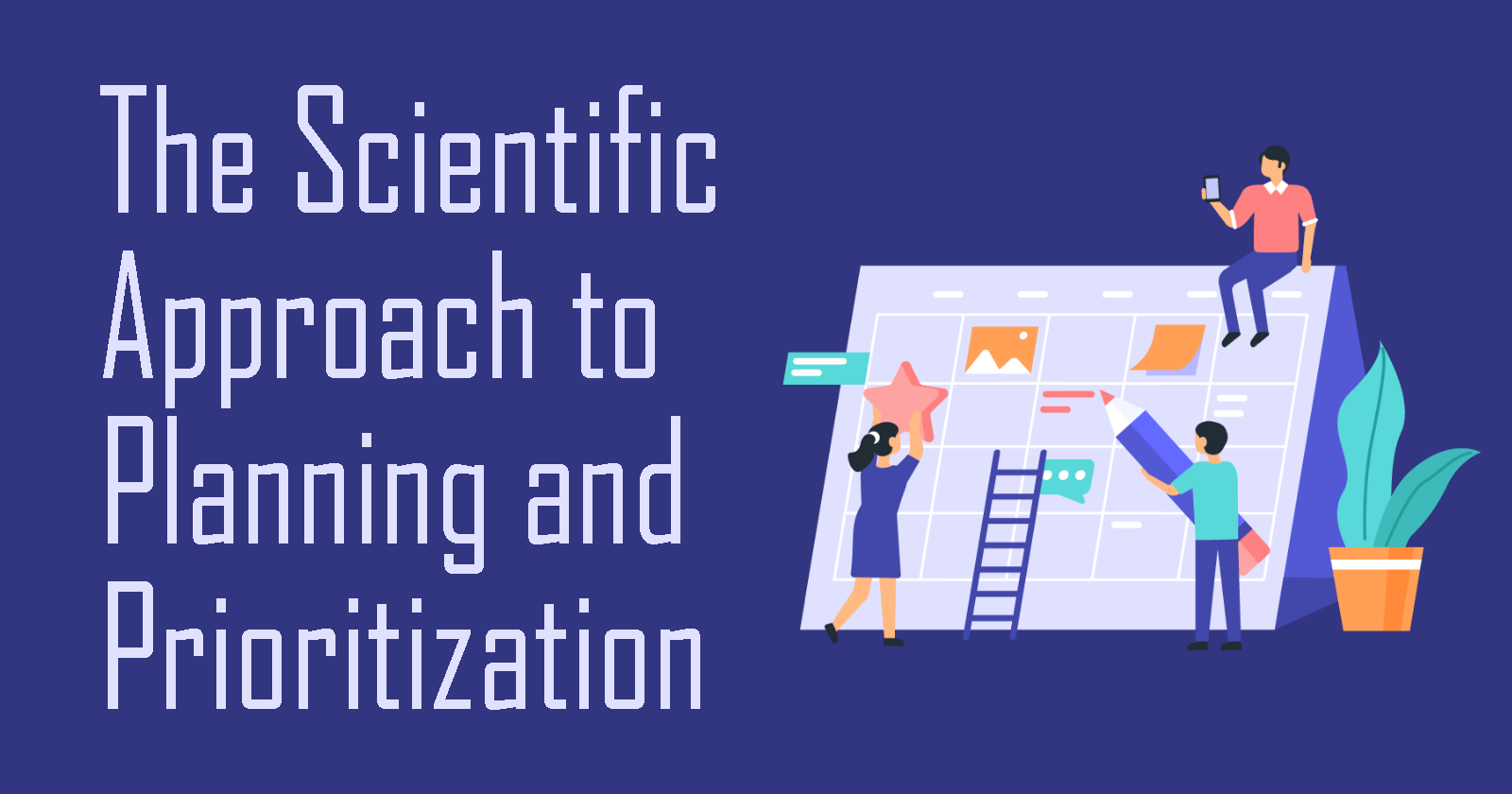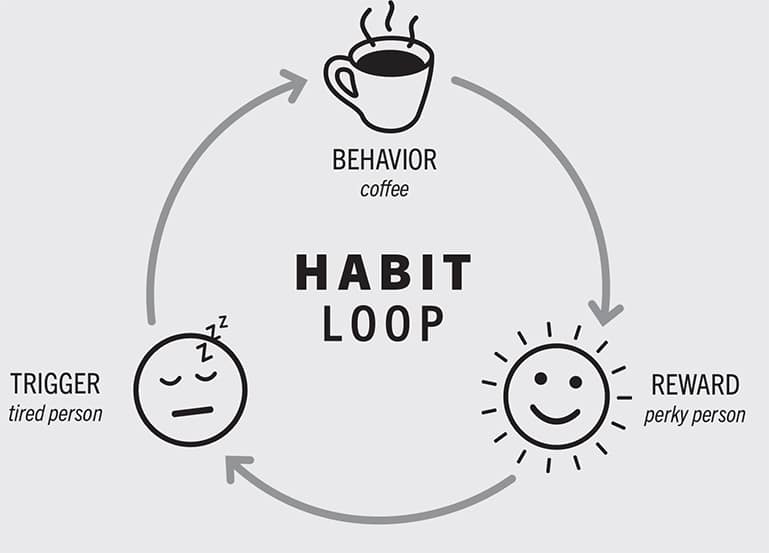The Scientific Approach to Planning and Prioritization

Hello everyone! It's been a while since I wrote a non-technical article, so I decided to write one. I have read a lot of books on time management and productivity lately so this article kind of serves as my reading notes. In this article, I will use the data and knowledge I have acquired from those books to suggest some scientific ways to become better at planning and prioritizing tasks.
Disclaimer: I am not a professional or expert in this field. I am merely using books and my personal experience to provide and suggest these practical tips.
1. Plan around tasks, not people
People are unpredictable creatures. Of course you can make plans with them but don't plan your day around them because it can lead to procrastination.
A scientific psychology article on this procrastinating behaviour was published in 2008, in which psychologists conducted studies and determined that,
"Procrastination is a misplaced coping mechanism, as an emotion-focused coping strategy."
This is, of course, highly correlates to individual factors too like personality traits, emotional tendencies and personal motivations.
Planning your day around people means that you rely on them to fill your 24-hour day. However, because people are unpredictable, this increases the chance that your day will not go as you anticipated. If you started your day aiming to be productive and your plans changed due to someone's behaviour, your brain may try to cope the disappointment and minor stress with useless activities to fill up your lost time. Hence, this may make you unproductive for the rest of the day.
For example, you promise to meet a friend at 3.30pm, but he canceled at the last minute so now, you feel lost and unsure of what to do. You go home, you are not in such a great mood; probably because your plans were canceled. You end up playing games/procrastinating for the next 3 hours to make up for the time when you should have been with your friend.
On the other hand, planning around your tasks gives you flexibility and a strong mindset to accomplish things. Let's use the same example where your friend canceled you last minute. You have the following tasks planned:
Meet with friend (Canceled)
Buy groceries
Finish your assignment
Since your friend canceled, you move onto the next task you have on your list. You don't feel too emotional and so you don't procrastinate to deal with your friend's actions. In fact, since your friend canceled, you can see it positively because you saved 3 hours and now you have more time to finish your tasks. You stay productive for the rest of the day.
2. Schedule priorities, not just routine work
When you are buried in work, it is easy to forget your long-term goals and priorities. You focus too heavily on doing daily tasks and completing your to-do list for the day. While it is good to finish your routine tasks, it's also important to take a step back, organize your priorities and review what needs to be done for the next week or month.
Be visionary, that gives you a direction to work towards. Your daily tasks should reflect and progress towards your long-term goals. This gives the extra needed motivation to accomplish daily tasks and be consistent. After all, you cannot keep walking if you don't have a destination.
"The key is not to prioritize what's on your schedule but to schedule your priorities." - Stephen R. Covey
Once you do have a routine, stop and assess on it every 30 to 60 days. Ask yourself:
Is it working towards my long-term goals?
What are some challenging aspects about it?
Is it realistic?
What can I do to improve it?

Overall, prioritizing your goals should not be a one-time thing to do. It is, in fact, a system of short-term goals, long-term goals, motivations and personal values which has to be continuously monitored and updated.
3. Time Value of Time
Ever heard of the time value of money? If you tried to invest your money in a bank, you'll notice that the money earns compound interest every month. Sorry, I'm getting very math-y and finance-y here.
In short, this means that the value of money today will be more valuable tomorrow. The value of money grows over time. 1 dollar tomorrow is worth more than 1 dollar today.

The lesson here is: invest today, earn interest and value in the future.
So with that concept in your head, let me introduce to you the time value of time. It's basically the same thing but the currency is time. So 1 minute tomorrow is worth more than 1 minute today. This concept applies in your daily lives, without you noticing.
For example, you have a thesis due in 2 weeks. 1 minute is worth nothing to you at the present. You have a lot of time to get it done. But fast-forward to when the paper is due in 2 hours, 1 minute is worth a thousand times more in the future than in the present.
So, exactly like the time value of money. In the time value of time, we invest our time today and earn the "interest" in the future. This is the key mindset to have when dealing with prioritization. After all, goals cannot be achieved overnight. It is through consistent time investments and slowly earning that accumulated interest so that it will pay off in the future.
Treat time like money. You can spend it on things you want to do now, but you also need to invest it for the future and your growth. So allocate your time budget wisely based on your priorities and plan.
4. Build Habits Slowly
There's a quote that I really like that goes:
"Motivation is what gets you started. Habit is what keeps you going." - Jim Ryun
The power of developing good habits is often underestimated. But good habits does make a good person. The problem is that it is hard for habits to stick immediately. Doing something once or twice a week does not make something a habit.
Atomic Habits by James Clear is a great read for me because it taught me the simple ways to start building and making habits automatic. Some of the key lessons I've learned from the book:
1. Improve the system before goals
Before trying to reach your goals, you must first inspect the system aka your habits.
For example, if your goal is to be healthier, start with inspecting your daily habits. Do they reflect or aid in the pursuit of your goal? Do they get in the way of your goal? How can they be improved?

Being aware of your system helps you determine which habits are bad or good. Improve on the good and remove the bad. An efficient system will get you closer to your goals much faster.
2. Don't just change your behaviour, change your identity
According to the book,
"Research has shown that once a person believes in a particular aspect of their identity, they are more likely to act in alignment with that belief."
For example, people who have successfully lost weight don't just focus on eating less. They also change their identity as a 'sports enthusiast, vegan, hiker, etc.' By becoming this new identity, they become more intrinsically motivated and habits naturally stick for a long time.
So if you want to be a writer, start writing every day and create yourself an identity as a writer. Don't say "I'm going to be a writer". Say "I am a writer". It will reinforce your motivation and habits.
3. Understand the Habit Loop
This one is very crucial so it's hard to summarize it in a few sentences. I might write its own article if you guys are interested.
In summary, psychologists like Edward Thorndike and B.F. Skinner learned about habits during their experiments. It consists of 4 steps: Cue, Craving, Response, Reward.

Understanding how to use this habit loop to build good habits and eliminate bad ones is key to sustaining habits.
Make good habits easy to keep and bad ones difficult to stay. Start small and slowly, celebrate small wins and punish undesirable behaviours.
For more details, I recommend reading the entire book yourself.
The key takeaway is to build habits which will reduce procrastination and improve your planning/prioritization skills.
And that's all for now!
Thanks for reading such as long article! I hope you find it helpful. If it is, please like and share it around. I might write a part 2 because there're a lot of things I haven't included and the article is getting too long. Do you have any personal tips on productivity/planning/prioritization? Please let me know in the comments below. Cheers!
Further Reading
Atomic Habits by James Clear
Deep Work by Cal Newport




